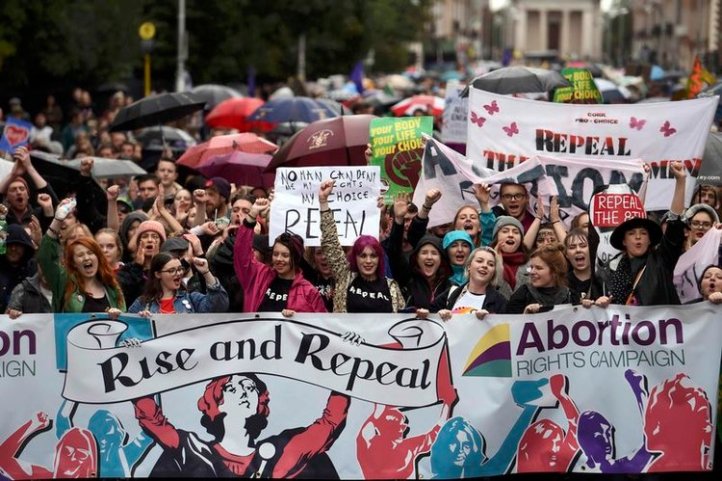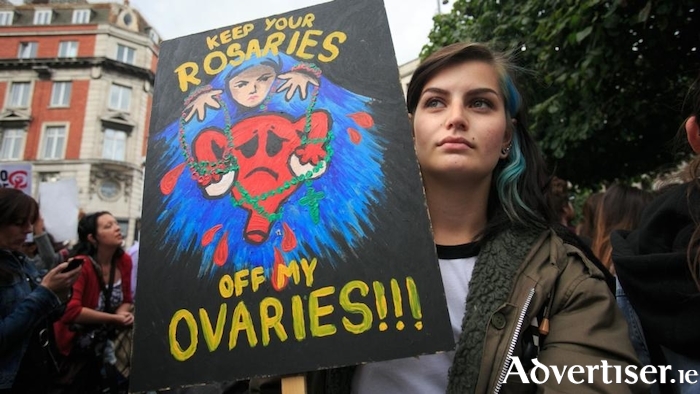
On the 25th of May, the people of Ireland will cast their votes in favor or against repealing the 8th Amendment (Article 40.3.3), a law implemented in October 1983 as a means of effectively banning access to abortion across the Republic of Ireland, rendering it a criminal offense with a potential 14 year imprisonment attached. Moreover, according to The Butler Scholarly Journal, “Ireland has one of the most restrictive abortion laws in Europe, permitting abortion to be carried out only where the pregnant person’s life is at risk from physical illness or suicide”. It is therefore of little surprise that the law has been described by media outlets and prominent human rights groups such as Amnesty International as draconian and in breach of the woman’s fundamental human rights. Nonetheless, there has been a staunch display of support on behalf of the no side ahead of voting day with one prominent governmental party recently announcing its support of a no vote (Fianna Fail). So as the yes campaigners on the front line persevere in their relentless battle for social justice and a long anticipated granting of equal rights to all irish citizens, I have chosen in the meantime to share my own personal reasons for voting to repeal the 8th, more specifically by focusing on what it means (and does not mean!) to be pro-choice. This list will hopefully compel those individuals perhaps on the fence or just plain overwhelmed by the whole crusade to consider a yes vote, for the sake of basic human justice and equality.
Because the 8th amendment does not stop abortions happening-It merely promotes unsafe abortions.
This is my first and perhaps most important point. According to a global study conducted by the World Health Organization and the Guttmacher Institute, the majority of unsafe abortions occur where abortion is illegal. Thus, repealing the 8th would provide women with access to safe abortion services, and proper aftercare. By voting no one seeks to deny the existence of abortion and to essentially export and marginalize the lived reality. This reality becomes hidden, on the cold tiles of a helpless woman’s bathroom floor, in a hospital bed across the ocean, or worse, in the eerie shadows of a dark alleyway or backstreet. As observed by minister Simon Coveney: “there is a false sense of reality here by maintaining the current wording of the Constitution and the current legislation of the Protection of Life During Pregnancy Act that we are somehow preventing abortion for Irish women – we are not”. So the mere notion that by voting against repealing the 8th, we are protecting women or that we value the mother and the fetus equally (“love both“) is blatantly false as it bypasses the everyday reality that nine women travel across the ocean to the UK to avail of abortion services while another 3 order abortion pills online in the meantime (See The Journal for more information). This leads to an annual toll of 3000 women traveling to England and a further 1500 availing of pills from the internet.
Because pro choice does not mean anti-motherhood.
Pro-choice campaigners do not bear a grudge against motherhood, nor do they wish to devalue the role of the mother or promote conflict amongst families. In many cases being pro-choice may promote the very contrary. Choice offers pregnant women the fundamental right to determine whether they wish to be a mother or not, restoring them with command over their own reproductive decisions. The point is that motherhood should never be mandatory and should be taken with the due seriousness and commitment it deserves. Pro-choice campaigners display a deep respect for motherhood by acknowledging the various considerations and discussions required before a woman decides if she is willing to raise a child.
Mothers should be able to seek comfort in the knowledge that their decision to have a child, to commit to the challenging task of parenthood, was a self determined choice. For this reason, I perceive it as wholly shameful that graphic pro-life posters are erupting in front of maternity hospitals, a blatant propagandist shock tactic which implies that the pro-life stance is the only viable option for new mothers, and that repealing the 8th amendment is somehow a threat to motherhood, which it isn’t. It merely promotes motherhood where it is wanted.
Because pro-choice does not equal pro-abortion.
Those who wish to repeal the 8th amendment do not necessarily like or celebrate the idea of abortion but rather see it as a measure considered in crisis situations, an option, and in many cases a last resort. It is never mandatory and gives the woman a say in her reproductive choices. Also, taking a pro-choice stance allows for the individual the option of personally believing abortion morally untenable in the instance of her own pregnancy, but does not grant her he right to enforce her own personal convictions upon all women, to inscribe it in the law that “everyone must see the same way I do”. The question of abortion bears a multiplicity of legal, medical and religious arguments, many of which are grounded in subjectivity, and opinion. As a result, views of the procedure vary greatly from person to person and rightly so. It is a deeply complex and contentious subject which bears both subjective and objective facets. The mere question of whether a fetus can be considered a human being raises a whole host of conflicting arguments, none of which are necessarily right or the definitive. Thus, it is doubtful that society will ever bear a unanimous opinion on its morality. For this reason, having the choice to decide for oneself appears is the fairest option for all.
Because every woman’s lived experience is different.
Being pro-choice means acknowledging and respecting the extenuating circumstances which govern the woman’s reproductive decisions and acknowledging that it is wrong to assume all situations as homogenous or that every woman has the ability to be an effective parent. (factors from addiction, poverty, mental health issues and fetal health to lack of social support, socio-economic status, accidental pregnancy, rape etc… all play a role in informing the woman’s decision). One needn’t venture beyond some of the stories published on the In Her Shoes Facebook page, a platform where women are permitted to freely voice their personal narratives in order for to gain an insight into the complex multitude of challenges and obstacles faced women as a result of the 8th amendment. These stories transcend the inherently propagandist shock tactics employed by the no side, shedding light on those marginalized, suppressed narratives too long ignored and stigmatized by a society that has perpetually sought to deny their mere existence. Reflecting upon these stories underscores the need for irish society to make amends for all the pain and anguish the 8th amendment has inflicted upon so many women. We have let these women down by permitting such a law to remain in our state legislation; by allowing a bill which effectively exacerbates the challenges endured by women seeking an abortion remain as part of our national identity.
Because religion should not inform our state legislation

The church-state partnership has too long sought to coerce and strip women of their rights as equal citizens (see Article 41.2 of the Constitution, the Magdalene laundry scandal, contraception bans etc…). We must prove to the world and more importantly to ourselves that we have come forward as a nation, beyond our terrorized past, seeped in stigma, shame and inequality towards women.
…and because everyone should have the right to practice their own religion or non-religion.
Religiously informed arguments regarding the “sacredness” of life from the point of conception should not be enforced on a whole nation as they are solely dependent upon one’s belief in a particular set of metaphysical or abstract concepts with no basis in logic. The catholic view of a fertile egg as a human being is wholly dependent upon religious faith and thus serves as an insufficient argument against abortion.
Because the 8th amendment entails a violation of the fundamental human rights of irish women

By obstructing the rights of women to reproductive autonomy, the state denies them the status of equal citizens as opposed to their male counterparts. This systematic discrimination arises from
1. the threat that the 8th amendment places over the lives of women (see the Savita Halappanavar case)
2. the inability of women to refuse invasive medical treatments during pregnancy and labour, due to the effort to prioritize the life of the baby. As stated in an article composed by Midwives for Choice, “pregnant women are the only group of mental competence whose rights are systematically undermined in the institutional health care setting in Ireland”(4).
and
3. the criminalization of abortion, resulting in stigma, a lack of social and medical support and the subsequent mental, emotional and physical trauma endured by women and girls.
Irish Council for Civil Liberties-Women’s Equality and the 8th Amendment
We must grant women the fundamental right of equal citizenship, to provide them with the liberty and autonomy they rightly deserve by granting them ALL of their rights, including those related to reproductive and bodily autonomy.
Because the 8th amendment reinforces traditional sex-role stereotypes, while promoting systematic gender inequality

Article 40.3.3 shames and vilifies women for deviating from their supposed “natural” role as mothers, a socially constructed definition which entails the forced confinement of the female subject to the role of mother. This deeply rooted stereotype is exemplified and reinforced in article 41.2 of the constitution which defines the woman’s place as being in the home:
1° In particular, the State recognises that by her life within the home, woman gives to the State a support without which the common good cannot be achieved.
2° The State shall, therefore, endeavour to ensure that mothers shall not be obliged by economic necessity to engage in labour to the neglect of their duties in the home.
http://humanrights.ie/tag/article-41-2/
The article alternates between the term mother and woman, in turn suggesting that the two are somehow synonymous. According to The Butler Scholarly Journal, “constitutionalising the relationship between women and the State entrenches the role of women as reproducing the population and reinforcing national identity through motherhood”. Moreover, the 8th amendment serves to exacerbate the pre-existing gender-based disadvantages faced by women; those political, social and economic barriers which impede a woman’s progress in patriarchal society. As asserted by the Irish Council for Civil Liberties, “Ireland’s abortion laws discriminate in particular against women and girls who have fewer resources and those who depend upon the State or others for care.” Providing women with a say over their reproductive choices thus enables them to properly prepare for their role as mothers, to ensure themselves financially, mentally and physically fit to embrace its various challenges before delving into the position.
Additional Resources:
Unsafe abortion: The Preventable Pandemic
Repealing the Eighth: Ireland, Gender Stereotypes, and Abortion Law
Women’s Equality and The 8th Amendment
From Cumann na nBan to de Valera’s constitution: rebel women betrayed








